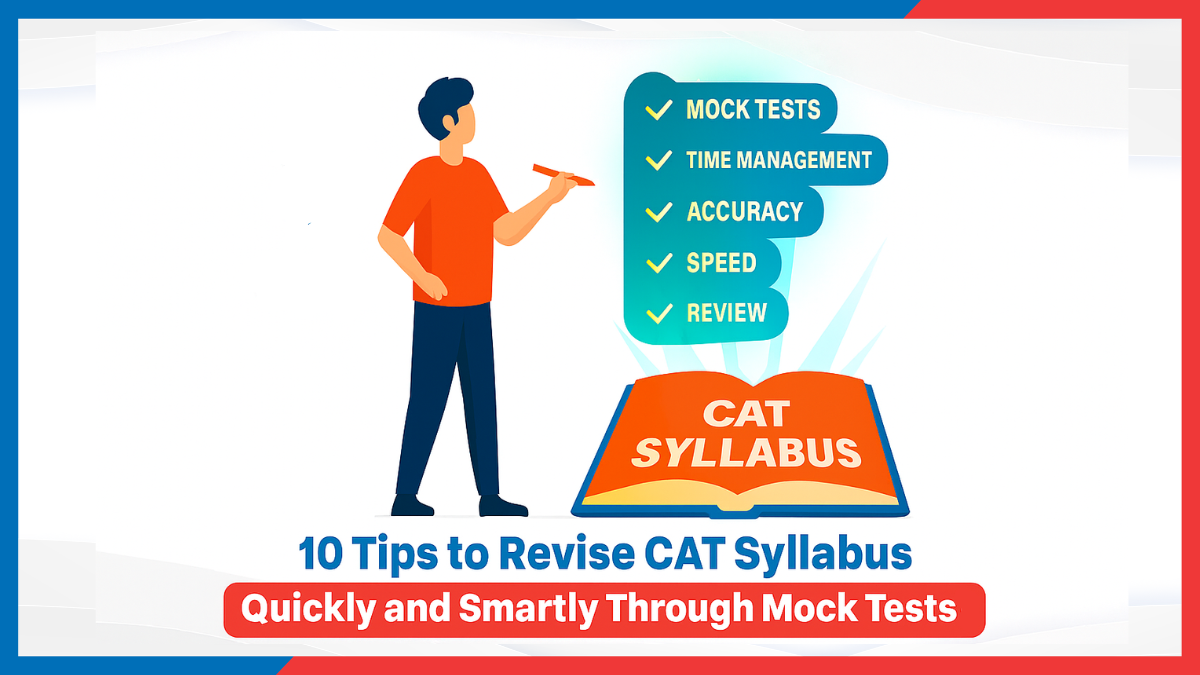
The syllabus for CAT is huge, and for many aspirants it would feel like a never-ending task. But if you go with the right approach, revising at the last moment wouldn’t feel like over burdening. One of the smartest ways to prepare is to practice tests. These tests won't just help you in checking your knowledge but will also sharpen your speed, boost your confidence, and help you recall the concepts faster. Instead of going through notes endlessly, you can make real progress with mock tests.
Must Read: How to Stay Consistent in CAT Preparation Every Day by Using Mock Tests and PYQs?
And here are ten simple practical tips to revise the CAT syllabus effectively using mock tests.
1) Cover one topic at a time
Don’t try to finish the entire syllabus at once. Before going on to the next section, concentrate on either quantitative aptitude, data interpretation, and logical reasoning, or verbal ability.
2) Take small tests after each topic
Subject-specific and manageable exams ought to be given priority. Imagine a 30- minute test that solely covers reading comprehension or algebra. Revision consequently becomes more concentrated and less stressful.
3) Check your mistakes after each test
It is insufficient to merely take practice exams. If you want to make the most progress, spend more time examining your errors, shortcomings, and unresolved questions.
4) Practice like it’s the real exam
Look for a peaceful, distraction-free spot to sit during lengthy exams. During in actual exam situations, this practice helps with time management and focus.
5) Track your weekly progress
Note your results in each section. You can determine which areas are improving and which require more attention by conducting a weekly review.
Recommended Link: CAT Previous years question papers
6) Revise shortcuts and formulas
Make sure you quickly review key formulas, grammar rules, and shortcuts before beginning any practice sessions. Faster recall during the test is ensured by this.
7) Mix chapter-wise tests with full papers
Both should be used. Full-length mocks assess overall readiness, while sectional mocks focus on particular problem areas.
8) Use free study material available online
If you don’t have time, think about using a cat mock test free. It’s an excellent way to increase practice without going over budget.
9) See which exam plan works best for you
During practice, experiment with different tactics, such as choosing which section to focus on first, how long to spend on each question, and when to skip. Instead of depending entirely on chance, practicing these strategies in advance ensures that you have a tested approach when you take the test.
10) Focus on quality and not just quantity
Avoid getting bogged down in attempting to solve every possible mock. Instead of practicing randomly, concentrate on a well-thought-out strategy using the best online CAT preparation resources. Accuracy and concept clarity will be guaranteed.
Are You a Teacher? For Latest Updated FREE CAT Specimen Sample Books for Teachers from our end.
Conclusion
Mock exams are helpful study aids that mimic the setting of an exam and reinforce ideas, and increase confidence. They're not merely drills. Using these ten smart strategies will help you not only cover the syllabus well but also improve your accuracy, speed, and problem-solving skills—all of which are critical for acing the CAT. For candidates, the real game-changers are consistency, discipline, and prudent practice. Every practice exam you take advances you towards your ideal. B-school while also helping you get ready for the real thing. Setting realistic objectives, reflecting after every attempt, and celebrating small successes will help you achieve mastery and a composed, confident CAT performance.













